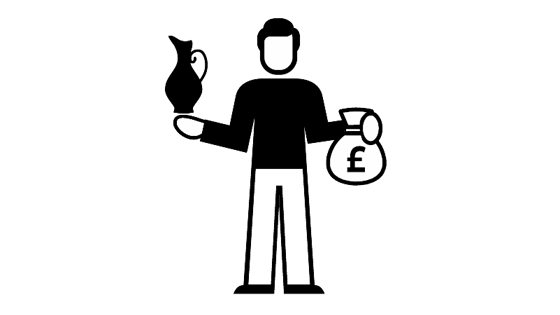Unscripted TV
Production buyer (Unscripted TV)
Also known as: Props buyer

What does a production buyer do?
Production buyers shop for a living. They work on big budget programmes that require a lot of props, such as entertainment shows and quizzes. Props can vary in size, from large pieces of furniture like sofas for a chat show to retro toys for quiz shows or fake plants for set dressing. They manage the budget and organise the purchase or hire, transportation and delivery to location, storage, packaging and returns of props.
Production buyers work closely with the production designer and art director and often become set decorators too, where they have more of an input into the dressing of a set to create a believable environment. They also liaise with the director and producer to ensure what they provide works with the requirements of the whole production.
Production buyers are usually freelance unless attached to large art departments.
What’s a production buyer good at?
- Shopping: build up a network of suppliers, specialist contacts and prop houses, including companies and individuals who can create and make props to order, organise hire and return of props, storage
- Resourcefulness: have a determination to find, source and acquire unusual items, using the most cost-effective solutions
- Art and design history: have a passion for design and a knowledge of its history, be aware of the latest developments in production design, including technology and materials
- Communication: understand what the production requires and why, and share thoughts and ideas clearly
- Knowledge of production: understand studio and location requirements and challenges, as well as health and safety compliance
Who does a production buyer with?
Production buyers generally work directly with an art director or production designer. They're likely to have contact with studio and technical staff, members of production and will have regular contact with the production management team regarding budgets and logistics.
How do I become a production buyer?
There is no set route to becoming a buyer, but it’s helpful to have a background in art and design and art and design history. Being well-organised and resourceful is just as important.
At school or college:
If you want to go to university, A-levels or Highers in art are useful. Or you might want to take the following Level 3 vocational qualifications:
- BTEC National Diploma/Extended Diploma Art and Design
- UAL Applied General Diploma in 3D Design and Crafts
- NCFE Applied General Certificate in Art and Design
If you want to go straight into a job or apprenticeship, the following Level 3 vocational qualifications will equip you:
- BTEC National Diploma in 3D Design and Crafts
- UAL Diploma/Extended Diploma in Art and Design
Get an apprenticeship:
An apprenticeship is a job with training, so it’s a great opportunity to earn as you learn. See if you can find a job as a junior prop master or props technician. If you can’t find one in TV, it’s worth looking for one in theatre. This could help you to understand the world of props. You can go on to become a buyer from there. Check out What’s an apprenticeship? to learn more about apprenticeships and find an apprenticeship to learn how to find one in your region, or approach companies directly. Go to ScreenSkills information on apprenticeships for the main apprenticeship schemes in television.
Learn to drive:
If possible, get access to a car. This makes you more versatile and means you can help more.
Get a degree:
It isn’t essential, but if you want a degree, you might want to have a look at ScreenSkills’ list of recommended courses and select one in unscripted TV. We recognise courses with our ScreenSkills Select award where they offer training in the relevant software, dedicated time to building a portfolio and have strong links with the TV industry.
Get work experience:
Try to get work experience by writing to local production companies and asking if they offer any. Keep an eye out for work experience opportunities at the BBC, Channel 4, ITV, Sky and the PACT Indie Diversity Training Scheme.
Network:
Get to know people in the unscripted TV industry by attending events. Meet professionals and ask them questions about their work, while demonstrating interest in and knowledge of the industry. Offer to provide them with your professional contact details and try to stay in touch with them. Go to how to network well to learn how to do this.
Network online:
Create a LinkedIn profile. See if there are Facebook pages or other social media groups for people making unscripted TV in your area. There might even be groups for runners and trainees. Join them. Create a ScreenSkills profile. There are a lot of crewing agencies that will charge you to be on their books. Sign up to the free ones initially. Wales Screen, Northern Ireland Screen and other areas offer free crew databases. Find a film office near you and get connected. If you do sign up to paid sites, make sure they specialise in the areas in which you’re interested.
Search for jobs:
Research unscripted TV production companies that you’d like to work for and watch the programmes that they make. Regularly check their websites and job listings websites to see if they are advertising for roles. You can also send in a short speculative letter with your CV to the production manager. Register your CV on websites like The Talent Manager, which is used by most broadcasters and independent production companies when looking for staff. StartinTV offers tips on creating your CV and attending interviews, as well as some advice on your first day working in TV.
You might also be interested in…
Being a production buyer in film and TV drama. This role is less office-based with more opportunities to go on set.






